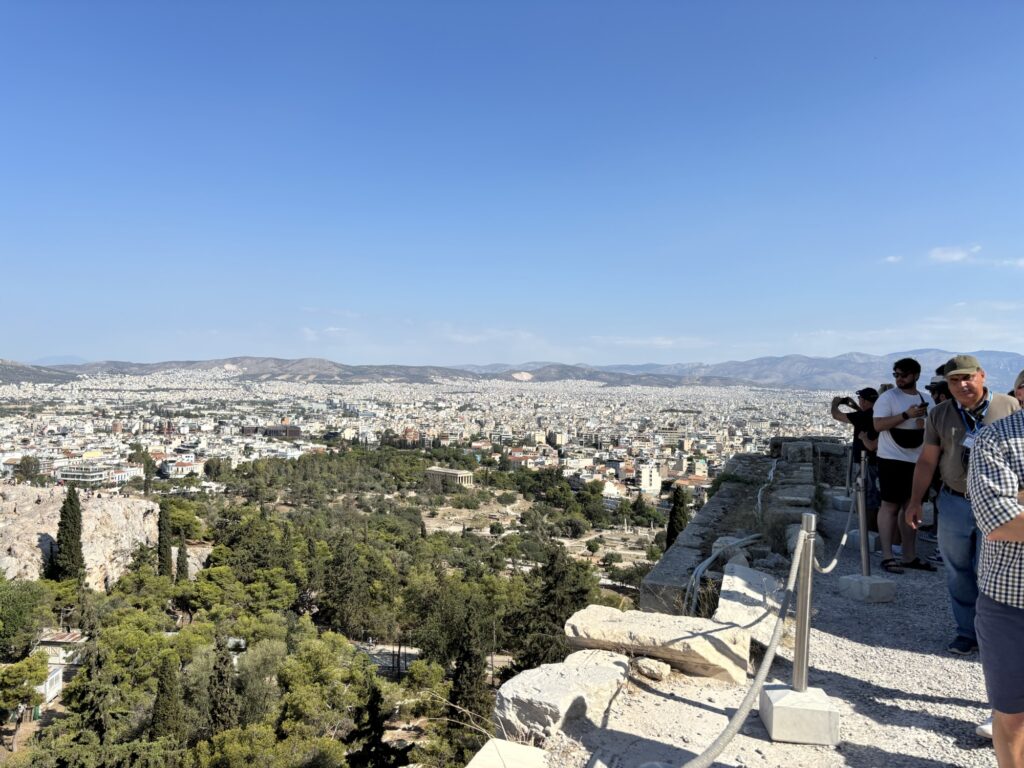On day 7 of our Greek Island Travel Devotional Tour we found ourselves docked in Athens. This was they day I had been looking forward to most of all–the day we would walk in the steps of the Apostle Paul and see where he preached his Acts 17 sermon to the Athenian Supreme Court. But it was not to be.
A hill too far
I woke up worse than when I had gone to sleep. I made it as far as the port terminal but was feeling feverish and generally horrible and didn’t want to get the rest of the team sick or be the worse off after 5 hours in the 90 degree Athens heat. So, I went back to the ship and sent the GSB team on without me.
The Wife returned nine hours later with shopping bags and complaining that there was no place to buy potato chips on the ship. I asked her if she and the team had seen Mars Hill, where Paul had preached. She said, “Where was that?”

I asked her to show me her pictures, which were a handful of shots of the Parthenon and some other sites I didn’t recognize. In one of the photographs (above), on the very edge, I saw part of Mars Hill. I showed her, pointing to Mars Hill (and the people on top of it), and asked if she had gone there. She said didn’t know what it was or how to get there. So, “No.”
I asked if she walked from the Agora up the path Paul walked toward Mars Hill. She said she never such a path, but they did find their way to the shopping district.
Whether this lapse into anarchy was a result of a void in leadership occasioned by my absence or out-right rebellion may never be fully known. I decided Christ Pantocrater would likely give them the right hand of blessing rather than the left hand of judgment, and I should do the same.
The boldest sermon ever?
On that rocky outcropping, sometimes referred to as the Areopagus or Mars Hill, the Apostle Paul preached one of the boldest sermons in history. He preached to the Areopagus Council, the highest court of Athens, which heard the most important criminal and religious matters.
Paul told them (paraphrasing), “I’ve noticed from your statues and altars that you are very religious, and that you even have an altar ‘to an UNKNOWN GOD.’ I’m here to tell you about the God you worship in ignorance. He created everything, He does’t dwell in temples, and His image can’t be captured by man-made idols. And He is declaring that men everywhere should repent because He will judge the world through a man He has appointed, having furnished proof to all men by raising Him from the dead.”
That’s bold, but what you don’t fully appreciate until you are standing there on Mars Hill is that as Paul was preaching to these pagan judges, in the background was the most famous pagan temple in the world, the Parthenon. Paul must have realized he was risking his life to preach to these Athenian leaders.
Now when they heard of the resurrection of the dead, some began to sneer, but others said, “We shall hear you again concerning this.” So Paul went out of their midst. But some men joined him and believed, among whom also were Dionysius the Areopagite and a woman named Damaris and others with them.
Acts 17:32-34
It appears Luke was not present with Paul on Mars Hill, so it is likely Paul told Luke about the sermon later and probably only gave him the synopsis we find in Acts 17. Those who sneered were likely Epicureans (who didn’t believe in God or an afterlife) and those who wanted to hear more were likely Stoics (who shared some beliefs in common with Christianity). But most significantly, one member of the Areopagite Council, Dionsysius, believed, along with a woman who was present.
What made Paul’s sermon work
People spend a lot of time studying the words and structure of Paul’s sermon, and there are things to be learned to be sure, but even Paul did think the conversion of an a Supreme Court justice through a single sermon was the result of his persuasive skills. Paul would later say in his letter to the Corinthians:
For Christ did not send me to baptize, but to preach the gospel, not in cleverness of speech, so that the cross of Christ would not be made void. For the word of the cross is foolishness to those who are perishing, but to us who are being saved it is the power of God.
For the kingdom of God does not consist in words but in power.
Paul was not bold because he had confidence in his own persuasiveness but in the power of God to move on people’s hearts when he spoke. And, here is the thing, if we are willing to share the gospel, we can witness the same power of God that transformed the heart of Dionysius.
What we know from history is that Dionysus would later become the first Bishop of Athens, and that pagan temple, the Parthenon, sitting on top of the Acropolis in the background as Paul preached, would be converted to a church in the sixth century under the Christian Byzantine emperor Justinian.
Paul changed the world not because he preached a perfectly structured, persuasive sermon in Athens, but because he preached the gospel to people who needed to hear it, and because he did that he unlocked an avenue for the power of God to work in their hearts. Evangelicals spend much time chasing after the power of God for miracles and healings. But the power has always been available for us to experience, and it is in the gospel, if only we will share it.
Until tomorrow. GS


